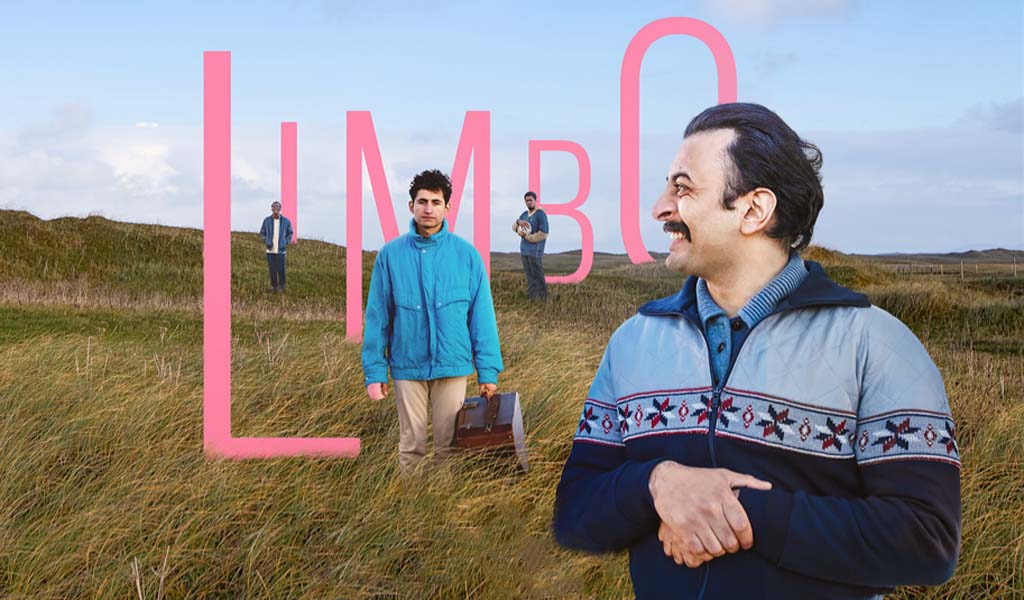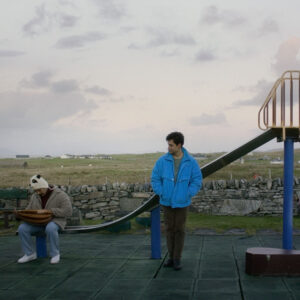
All About Ben Sharrock’s Limbo
Ben Sharrock’s Limbo at The Courtyard Friday 20 – Thursday 26 August
Ben Sharrock’s critically adored deadpan comedy-drama Limbo is a wry, funny and poignant cross-cultural satire that subtly sews together the hardship and hope of the refugee experience. Shining a light on the hearts and lives of those at the centre of a crisis that is mostly only experienced through the headlines.
Set on a fictional remote Scottish island, Limbo tells the story of a group of new arrivals awaiting the results of their asylum claims. It centres on Omar (played by rising star Amir El-Masry), a young Syrian musician who, thousands of miles from home, finds himself trapped by guilt, regret and the grief that he carries for the loss of his former identity. Separated from his family and burdened by a plaster cast on his arm, Omar wanders the epic landscapes searching for answers to a complex past and daunting future.
But while he is stuck there, he isn’t alone. In between brief long-distance conversations with his parents and passing interactions with oddball locals, Omar and his new flatmates attend outrageously misjudged ‘cultural awareness’ classes, binge Friends boxsets, and debate attending the local open mic night, all the while waiting for the delivery of letters that will ultimately determine their future.



Ben Sharrock – Director’s Statement
To date, my tendency as a filmmaker has been grounded in looking at the impact of global socio-political issues through an absurdist lens, with a desire to try and distil big topics down into an individual, existential, human context while using humour. Alongside this, the particular aesthetic is inherently linked to the style and mode of storytelling, which together encapsulate the tonal feel of the film. From the beginning, the script is shaped with the style in mind but importantly, I never want it to be dictated by stylistic elements.
The journey towards Limbo started out with a strong personal desire to make a film that, broadly speaking, touches on the subject of the ‘refugee crisis’ by focusing on the individual human experience of a Syrian asylum seeker.
This urge stems back to my time living in Syria as part of my undergraduate degree in Arabic and Politics. I spent a year living and studying in Damascus the year before the civil war started. I tried to integrate into society so I joined the Damascus rugby team and participated in a local theatre. With the rugby team I went on tour to Lebanon and as a result I made friendships that were only, if anything, inhibited by the poor standard of my Arabic. For anyone who knows, a mispronunciation of a single letter can totally change the meaning of what you want to say! Fortunately, I still managed to come away with some friends.
When I returned from Syria for my final year at uni I started to specialise in Middle Eastern Cinema and opted to write my dissertation on Arab and Muslim representations in American Cinema and TV. Later, I think this played a role in my response to broad media representations of refugees in the years that followed. Some of my friends from Syria have since become refugees, but I felt like in the UK and across Europe we were witnessing a process of dehumanisation at both ends of the spectrum. On one side there was demonisation and on the other there was the pitying of refugees, which, while often with good intention, became equally dehumanising. Around this time, Irune Gurtubai (the producer) and I travelled to the refugee camps in southern Algeria. We stayed with a family in their home there while we developed a short film and worked with an NGO on a project about how the label of being a ‘refugee’ impacts one’s identity. This really stuck with me and a couple of years later, I felt like the topic and the desire to make a film about this had attached itself to me. I had an idea of what I wanted to avoid in approaching this subject matter and the process started with interrogating and clearly defining these things through a lot of research, speaking with people who had been through the asylum system and organisations who work with refugees on a day to day basis. Sensationalising the subject and using a Western character as a vehicle to tell this story were at the top of the AVOID list. And importantly, to my relief, the idea of using humour was very warmly received.
Rather than talking about asylum seekers and their role within western societies, I wanted to isolate the idea of an asylum seeker and in part, separate this identity from prejudices present in a societal context. The purpose of this was to give a different kind of strength, vulnerability and representation of an asylum seeker. At its core, Limbo is about an individual. It’s about the introspective journey of Omar – a young Syrian musician who separated from his family and homeland becomes affected by the label of being a ‘refugee’, and starts to grieve for the loss of his own identity. The most essential part of this was to create a truthful universality to Omar and the other characters’ stories. Rather than witnessing a story about cultural reconciliation or creating engagement through an onscreen western character befriending refugees, I wanted to very directly connect the audience with the refugee characters onscreen. I wanted the audience to feel close to these characters regardless of race, creed or circumstance and regardless of them being asylum seekers. It was important for me to avoid passive engagement. I wanted to put these characters front and centre and challenge the audience to see part of themselves in them or at the very least, cherish the time spent in the cinema with Omar, Farhad, Abedi and Wasef.
All film tickets are only £5 this August at The Courtyard.

